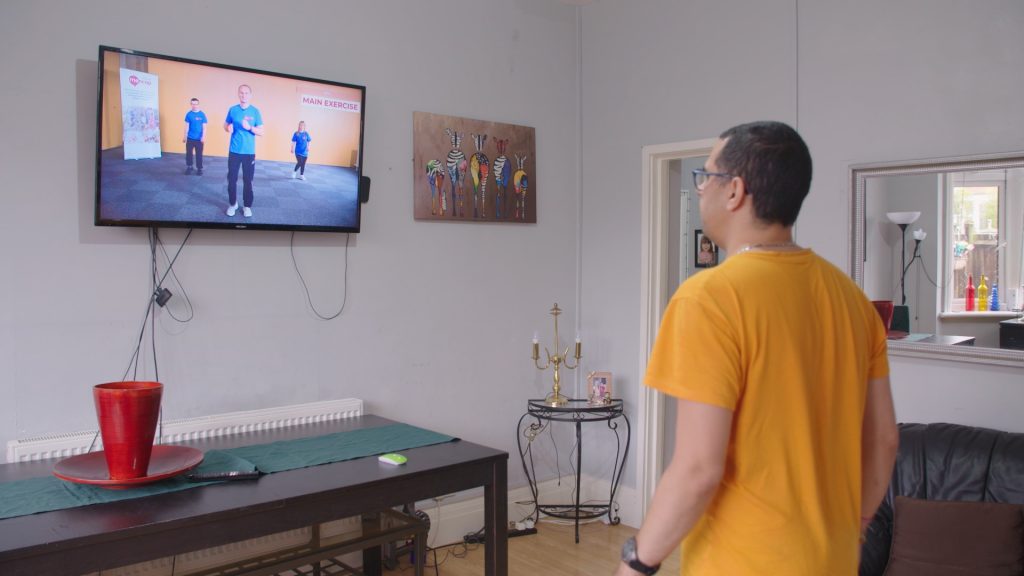Merton Mencap have launched a new film for people with a learning disability and autism and their carers, to gain a better understanding of how the internet and technology can support them in everyday life. The film can also be used by professionals like social workers, supporting families by demonstrating the value and positive difference the internet can make to their lives. Merton Mencap worked with South West London ICS to secure funding for the project and to understand the barriers to using digital technology to connect with others and how they can be overcome.
Conducting an interview remotely, using a tablet to enjoy sport or music and taking an exercise class are just some of the ways a new video shows how people with learning disabilities, autism and their parents or carers can benefit from the internet and digital technology.
With national Carers Week (6-12 June) under way, the video launched by independent charity Merton Mencap reveals how the internet enhances the lives of people with a learning disabilities and/or autism and their parents and carers in varying ways, including supporting them to discover hobbies and interests, participate in leisure activities and manage everyday tasks more easily.
In the three-minute film (which you can watch above) a man who is non-verbal uses an app on his tablet to communicate with his family, a woman uses her smartphone to check bus timetables and take pictures with a friend to save as memories and people shop online and order prescriptions.
The ‘Promoting Digital Confidence’ video was produced after the charity carried out research with the support of the NHS England and Improvement Mind the Gap programme of funding which aimed to help identify and support carers from vulnerable communities. The charity worked with South West London ICS to understand the barriers to using digital technology to connect with others and how they can be overcome.
With technology now such an integral part of everyday life – a fact made even clearer when the pandemic forced the world online during lockdown – the video got the backing of Maria, whose 24-year-old daughter Amelia has a moderate learning disability and autism.
During lockdown Amelia’s sister and mother helped her to become more digitally active and to access Zoom sessions. They still entered her user ID and passwords and helped to download apps. Maria says Amelia is now very good with the basics and has started to learn how to use email.

“It is all about supporting our cared for person to not be left behind. If Amelia had not become more digital during lockdown, she would have been a very lonely young lady.”
Maria, whose 24 year old daughter Amelia has a moderate learning disability
She added: “The film was really good. It was good to see carers using the internet for shopping, medication and booking appointments with their GP. I am now thinking that I should really make the effort to learn to use the NHS app and Patient Access to book appointments.
“When I saw the young man playing music using headphones, I realised that Amelia should use headphones in her bedroom so she can listen and sing or dance without annoying the neighbours.”
Andrew Whittington, Chief Executive of Merton Mencap, said:
“The purpose of the film is to help people with learning disabilities and/or autism and their parents and carers who regard the internet as inaccessible or irrelevant to know that many people in similar circumstances routinely use the internet to enhance their lives.
“We hope the film may lead people who don’t currently use the internet to want to explore doing so, and local support exists to help them to do that.”
This video, which is a fantastic example of the benefits of great partnership working”
Dr Vasa Gnanapragasam, Merton GP
Merton GP Dr Vasa Gnanapragasam said:
“This video, which is a fantastic example of the benefits of great partnership working and is available for anyone to watch, will help support some of the more vulnerable members of our community build the confidence to improve their digital skills and reap the benefits of being online and using new technology.
“For many people with learning disabilities and/or autism being able to access the internet is a vital way to stay connected to friends and loved ones in a world where technology is now an integral part of everyday life and one that has been so crucial during the pandemic in helping to overcome loneliness and potential mental health issues.”
Debbie Hustings, Regional Carers Lead, NHS England London, said:
“The NHS Commitment to Carers Team are proud to support the amazing work Merton Mencap have done to support service users and carers stay connected through digital technology. We are also grateful for the commitment shown by South West London CCG in working to embed this approach.
“Merton Mencap worked with people to really understand the barriers to digital inclusions for their service users and carers and thought creatively and practically to help keep everyone connected.”
